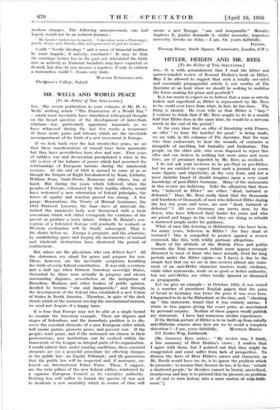MR. WELLS AND WORLD PEACE
[To the Editor of THE SPECTATOR.] .Sin,—The recent publication in your columns of Mr. H. G. Wells' striking article "The Frustration of a World Pax" —which must inevitably have stimulated widespread thought on the broad question of the development of inter-State relations—was particularly opportune inasmuch as we have witnessed during the last few weeks a recurrence of those 'acute . pains and labours which are the inevitable accompaniment of the birth of a new Movement in Europe.
If we look back over the last twenty-five years, we see that these manifestations of travail have been spasmodic but they have nevertheless been slow and sure. Four years of ruthless war and devastation precipitated a crisis in the old system of the balance of power which had governed the relationships of European nations during the nineteenth century. At the end of 1918 it seemed to some of us as though the Empire of Right foreshadowed by Kant, Liebnitz, William Penn, Saint-Pierre, Rousseau and others, was at hand. But during the years which followed, when the peoples of Europe, exhausted by their warlike efforts, would have welcomed a new orientation of federal principles, the forces of apathy and reaction proved too strong. A few pangs—Reparations, the Treaty of Mutual Assistance, the 1924 Protocol, Locarno, the Saar—have at intervals dis- turbed this inanimate body. now threatened with a fresh convulsion which will either extinguish the existence of the parent or produce a lusty infant. Either M. -Briand's con- ception of a federated Europe will gradually be realised, or Western civilisation will be finally submerged. That - is the choice before us. Europe is pregnant, and the scientists, by annihilating space and forging the instruments of mutual and wholesale destruction have shortened the period of confinement.
: But where are the physicians who can deliver her ? All the statesmen cry aloud for peace and prepare for war. These, however, are the inevitable symptoms heralding the birth of every federal constitution. It was only a century and a half ago when thirteen American sovereign States, distracted by three wars actually in progress and eleven outstanding disputes, nevertheless at the instigation of Hamilton, Madison, and other leaders of public opinion, decided to beCome "one and inseparable," and through the development of the federal idea established a new Union of States in North America. Therefore, in spite of the dark clouds which at the moment envelop the international horizon, we need not despair of a happy issue.
• It is true that Europe may not be able at a single bound to emulate the American example. There are degrees and stages of federalism, and the immediate problem is to dis- cover the essential elements of a new European order which will ensure justice, promote peace, and prevent war. If the peoples want peace, and if the statesmen are sincere in their protestations, new institutions can be evolved within the framework of the League as integral parts of its organisation. I would submit that, under existing conditions, these essential elements are (a) a peaceful procedure for effecting changes in the public law—an Equity Tribunal ; and (b) guarantees that the Public law will be respected and, if necessary, en- forced—an International International Police Force. These, I suggest, are the twin pillars of the new federal edifice, reinforced by a supreme European Council as its .executive authority. Nothing leas will suffice to banish the spectre Of War and to inculcate a new mentality which in course of time will -:create a pew TEurnpe, c! one and inseparable." Morality implores it, justice 'deniands it, whilst necessity, imperious necessity, brooks no delay.—! am, Sir, yours faithfully,
DAVIES.
Thorney House, Smith Square, Westminster, London, S.W.1,










































 Previous page
Previous page